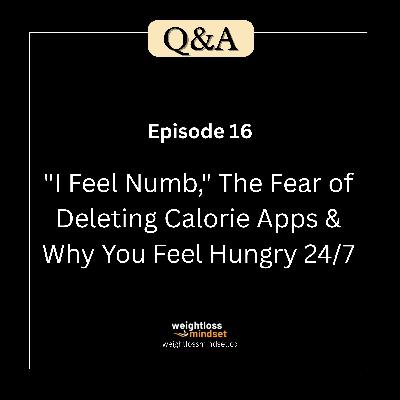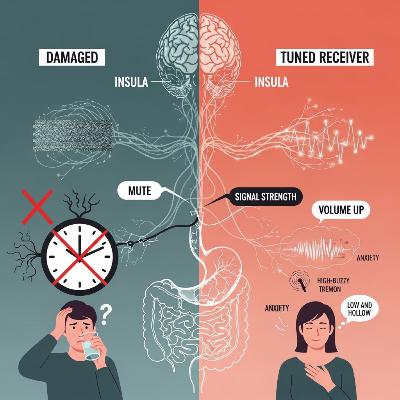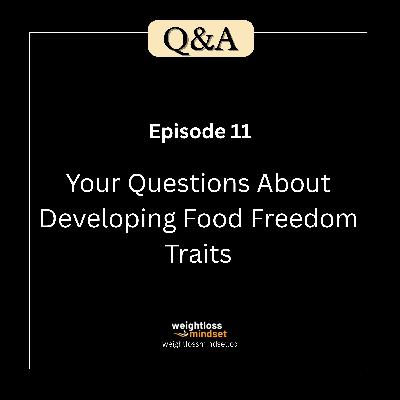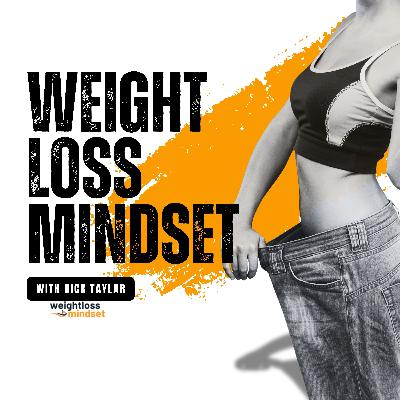Discover Weight Loss Mindset
Weight Loss Mindset

Weight Loss Mindset
Author: Weight Loss Mindset
Subscribed: 816Played: 10,134Subscribe
Share
© 2025 Weight Loss Mindset
Description
Struggling with weight loss despite trying numerous programs? The key lies in your mindset. 'Weight Loss Mindset' delves into the psychological aspects of weight loss, offering strategies to reframe your thinking for sustainable results. Join us to explore how a transformed mindset can lead to lasting weight loss success. Subscribe now and step into a journey to a healthier you!
weightlossmindset.co
402 Episodes
Reverse
We treat dieting like a reset button. We assume we can wipe the slate clean with a new plan and fresh discipline. But the brain keeps a record. In this episode, we explore the neuroscience of the "Diet Trap" and how chronic restriction creates a "Hunger Highway" that makes food noise louder and willpower weaker. We stop blaming your character and start looking at the engine—specifically, how to shift from a "Red State" of threat to a "Blue State" of safety to finally turn down the noise.Important points discussed:The Willpower Gap: Why you are working twice as hard for half the results compared to ten years ago.The Hunger Highway: How neuroplasticity physically rewires your brain to become efficient at being hungry.Red State vs. Blue State: Understanding why your brain interprets a calorie deficit as a survival threat.The Binge Logic: Why bingeing is not a failure of discipline, but a successful biological rescue mission.Radical Maintenance: The counter-intuitive protocol required to heal the metabolic damage and shut off the alarm bells.Action Step: Stop the deficit. This week, your goal is "Radical Maintenance." Feed your body consistently to convince your brain the famine is over. You cannot rehabilitate a damaged organ while you are still attacking it.
In this follow-up to our deep dive on Interoception, we tackle the real-world struggles of reconnecting with your body. We discuss why you might feel "numb" when you try to scan your body, why some people feel hungry 24/7 (and what it really means), and whether you can heal your relationship with food while still tracking calories.Key Questions Answered:What if I do the body scan and feel absolutely nothing?Why does it feel like I’m hungry every waking hour?Do I have to delete MyFitnessPal to learn intuitive eating?How do I find the "stop" signal when I’m used to cleaning my plate?I know it’s anxiety, not hunger—but I still want to eat. Now what?Action Step: Try the "Halftime Pause". At your next meal, stop eating when your food is half gone. Put the fork down for two minutes. Don’t look at your phone. Just sit. Give your satiety signal time to travel from your gut to your brain.
The Somatic Signature of Hunger: Why You Can't Tell When You're Actually HungryEpisode Summary: You’ve been told to "listen to your body" and "eat when you're hungry." But what if you’ve been listening for years and hear absolutely nothing until you’re starving? In this episode, we dismantle the myth of Intuitive Eating for chronic dieters. We explore the neuroscience of interoception, your body’s internal dashboard, and how years of restriction have effectively cut the wire between your gut and your brain.If you feel like you're flying blind without a calorie tracker, this episode explains why and how to turn the lights back on.Important points:The "Deafness" of Dieting: How ignoring hunger signals for years has trained your brain to treat biological cues as background noise.Interoception 101: Understanding the "8th sense" and the role of the Insula in regulating your weight.The Intuitive Eating Trap: Why standard advice to "trust your gut" backfires for dieters who have lost their somatic connection.High & Buzzy vs. Low & Hollow: A practical tool to distinguish between anxiety (nervous system activation) and true biological hunger.Rebuilding the Hardware: Why you need "physical therapy" for your interoception before you can successfully eat intuitively.Action Step: Practice the Non-Food Body Scan three times a day. Stop for 30 seconds and locate a sensation (temperature, pressure, heartbeat) that has nothing to do with food. You are retraining your brain to receive data from the body again.
In this Q&A, we go deeper into the concept of Identity vs. Discipline. We tackle the specific, messy roadblocks that popped up after Monday’s episode—specifically the fear that identity work is just "delusional" and the exhaustion of the evening binge.Questions Answered:The Evening Crash: Why you have zero discipline after 5:00 PM (and why it’s not your fault).Imposter Syndrome: Is "acting" like a healthy person just lying to yourself?Identity Grief: What happens when your whole personality is tied to being the "funny fat friend"?When It "Fails": I asked the identity question and still ate the cookie. Now what?Starting Small: How to shift identity when you have 100+ lbs to lose.Key Takeaway: Transformation is a grieving process. You have to be willing to "kill" the old version of yourself to give birth to the new one. This isn't just about calories; it's about who you are in the world.
We are taught that weight loss is a test of character. If you are overweight, society tells you it’s because you lack the willpower to say "no." You likely believe this too. You wake up every Monday promising to be "better," to white-knuckle your way through cravings, and to force your body into submission. But by Friday (or Tuesday night), you’re exhausted, and the binge feels inevitable.In this episode, I’m challenging the holy grail of diet culture: Discipline. I explain why relying on willpower is actually a symptom of a misaligned identity, not a solution. We discuss why discipline is a finite battery that will always fail you when you are tired, and how to shift into an "Identity Mindset" where making healthy choices feels as natural as brushing your teeth.Important points from episode:The Battery Problem: Discipline is a finite resource. Every time you stifle an emotion, focus on a hard task, or say "no" to a donut, you drain the battery. By 8:00 PM, you aren't weak—you are depleted.Identity vs. Acting: Most dieters are "actors" playing the role of a healthy person. It takes immense energy to stay in character. The goal is to stop acting and start being.The Rubber Band Effect: Trying to change your body without changing your identity is like running against a rubber band attached to a post. Eventually, the tension snaps you back. Identity work moves the post.Friction vs. Flow: Discipline asks, "How can I force myself to do this?" Identity asks, "Who do I believe I am?"Action Step: Next time you feel the need to use "discipline" to make a choice, pause. Ask yourself: "What would the version of me who has already succeeded do in this moment?" Borrow that identity for just ten seconds.
In this Q&A episode, we follow up on our deep dive into Polyvagal Theory to answer your real-life questions about nervous system regulation. We tackle the fear that self-compassion is just "making excuses," practical tips for regulating your anxiety in public, and the terrifying (but necessary) shift away from restriction to stop the binge cycle.Important Points CoveredCan You Be in Two States at Once? Yes. We discuss "mixed states" (like feeling "wired but tired") where you might experience anxiety and numbness simultaneously. The solution isn't a perfect label, but asking: "Do I need to discharge energy or do I need comfort right now?"The Fear of Losing "The Stick" (Shame) We address the common fear that without shame and strict rules, you'll eat everything in sight. We explain why shame is actually a danger signal that keeps the binge cycle going, and why safety is the only environment where true self-control can exist.When the Tools "Don't Work" If you used a somatic tool (like shaking) and still binged, you didn't fail. We reframe this as a win because you created a pause and awareness. Nervous system retraining is about repetition, not immediate perfection.Stealth Regulation for Public Spaces You can't shake your body in a meeting. We offer "Stealth Tools" for social situations, including the "Grounding Press" (feet on floor), the physiological sigh, and using cold water on your wrists to reset the vagus nerve discreetly.Safety vs. Weight Loss We tackle the hard truth: You cannot heal a body you are threatening with restriction. We discuss why prioritizing nervous system safety (stopping the famine signal) is actually the fastest path to stabilizing your weight and ending the binge urge.It is normal to feel scared when you put down the weapon of shame. But remember, you are trading the illusion of control for actual freedom. If you try one of the "Stealth Tools" this week, I'd love to hear how it went! Hit reply to my newsletter or tag me in your stories.Key Takeaway Shame is not a strategy; it is a safety threat. True change only happens when your nervous system feels safe enough to let go of the old patterns.
In this episode, we explore the biological reason why willpower so often fails in the face of binge eating. We dive into Polyvagal Theory to understand how your autonomic nervous system hijacks your decision-making to keep you safe, explaining why you can't simply "discipline" your way out of a survival response. You'll discover why your body is actually trying to protect you when it demands food, and how to create true safety without relying on the pantry.Important Points CoveredWhy Willpower is No Match for Biology We discuss the uncomfortable truth that binge eating is often a biological safety response, not a character flaw. When your nervous system senses a threat, it shuts down the logical part of your brain (the prefrontal cortex), making it physically impossible to access your "willpower" or long-term goals during a stress response.The Three States of Your Nervous System We break down the "traffic light" system of your body: the Green State (safe and social), the Red State (fight or flight), and the Blue State (freeze or shutdown). You'll learn how to identify which state you are in based on whether you are craving crunchy, aggressive foods (Red State) or soft, comforting foods (Blue State).Reframing the Binge as a Safety Solution Here is the part most people don't want to hear: your bingeing is actually a functional solution your body found to regulate your nervous system. We explain how the physical act of eating massages the Vagus nerve, providing immediate chemical relief from anxiety or numbness, which is why it feels so addictive.The Danger of Restriction We look at why the standard advice to "go on a diet" inevitably backfires for emotional eaters. To your primitive brain, restriction looks like starvation, which acts as a massive danger signal. This pushes you right back into the "Red State," creating a vicious cycle where trying to be "good" actually triggers the next binge.Practical Tools for Somatic Safety We move beyond theory into action with "Somatic Resourcing"—using your body to change your state instead of food. You'll learn specific physical movements to discharge anxious energy (like shaking or pushing) and gentle techniques to wake up from a shutdown (like humming or weighted blankets).Your body has never been your enemy; it has been your protector, working overtime to help you survive stress. If this episode resonated with you, I'd love to hear which "state" you find yourself in most often—Red or Blue? Reply to this week's newsletter. I'll see you Thursday for our Q&A, where we'll dive deeper into how to navigate these nervous system storms in real-time.Key Takeaway Binge eating is not a sign that you are broken or weak; it is a sign that your nervous system is desperately trying to regulate itself to keep you safe.
When you transform your relationship with food, you don't just change your behaviors - you change who you are. This episode reveals the uncomfortable truth about identity grief: to become someone who naturally takes care of their body, you have to grieve the loss of being "someone who struggles with food." This grief is real, necessary, and completely normal - but no one talks about it.Important Points Covered1. Identity Loss is Real Being "someone who struggles" has served you - it provided sympathy, understanding, community, and explanations for difficulties. Losing this identity, even though it was painful, involves genuine grief.2. Why No One Talks About This The wellness industry focuses on behaviors, not psychology. Grief feels negative when transformation should feel positive. It's easier to sell the destination than prepare people for the complex psychological journey.3. What the Grief Looks Like Missing the simplicity of diet rules, feeling disconnected from friends still in diet culture, losing the "someday" fantasy, and feeling scared about who you're becoming. All normal parts of deep transformation.4. This is Actually Good News Identity grief means you're changing at the deepest level possible. Surface-level changes don't involve grief - only real transformation does. If you're feeling this, the work is working.5. How to Navigate It Name the grief, be gentle with yourself, find support from people who understand identity change, and remember that grief and growth can coexist.If you're experiencing this grief, you're not broken or failing - you're growing. Real transformation involves letting go of who you used to be to become who you're meant to be. Join us Wednesday for the Q&A episode where we'll dive deeper into your questions about navigating identity grief.Key TakeawayIdentity grief during transformation is a sign that deep change is happening. You can miss your old self while still growing into your new self - both feelings can coexist and are completely normal.
Addressing the real fears and challenges of identity transformation. This Q&A episode tackles common concerns about changing your food-related identity, from feeling "fake" when trying new behaviors to handling setbacks and unsupportive people during your transformation journey.Important Points Covered1. Identity Isn't Permanent - It's LearnedThe belief "I'm someone who struggles with food" isn't who you ARE, it's who you've LEARNED to be. You weren't born struggling with food - you learned these patterns and can unlearn them. Try shifting from "I struggle with food" to "I'm learning to have a healthy relationship with food."2. Feeling "Fake" Is Normal and NecessaryActing like your new identity feels uncomfortable at first because you're trying on new behaviors. This isn't evidence you can't change - it's evidence you're growing. Authenticity comes AFTER behavior change, not before. Keep acting like your new identity even when it feels weird.3. Setbacks Don't Erase ProgressOne binge doesn't cancel three days of evidence collection. Old patterns will surge back as your brain tries to maintain familiar territory. Handle setbacks like someone who naturally takes care of their body: see them as information, not failure. Don't let one setback erase multiple days of growth.4. Realistic Timeline for Identity ShiftsSmall shifts happen within 1-2 weeks, deeper integration takes 2-3 months, and full identity transformation typically requires 6-12 months. Unlike diets that get harder over time, identity work gets easier as you collect more evidence and strengthen new neural pathways.5. Handling Unsupportive PeopleFamily and friends may resist your changes because your growth threatens their comfort zone. Set gentle boundaries and don't let their discomfort stop your transformation. Your job isn't to make everyone comfortable with your growth - it's to become who you're meant to be.Continue collecting evidence for your new identity one small choice at a time. Don't aim for perfection - aim for consistency. Trust that you can become someone who naturally takes care of their body, even when it feels unfamiliar. Keep sending questions about identity work as this is where real transformation happens.Key Takeaway"Identity change isn't about perfection - it's about consistency. You're not just changing what you do, you're changing who you are. And that changes everything. Feeling uncomfortable during the process is evidence you're growing, not evidence you can't change."
Discover why you can't out-behavior a limiting identity and learn the exact 5-step process for becoming someone who naturally takes care of their body. This episode reveals how to bridge the gap between knowing what to do and actually becoming the person who does it automatically.Important Points Covered1. The Identity ProblemMost people try to change behaviors without changing identity. Your behaviors will always align with your identity beliefs - if you see yourself as someone who "struggles with food," you'll prove that belief right even when trying to change.2. The Evidence Collection MethodIdentity shifts happen through proving it to yourself, not positive thinking. Start collecting small pieces of evidence that support your new identity: "I am someone who naturally takes care of my body."3. Bridge Your Existing IdentitiesYou're already the person you want to become in other areas of life. If you're reliable at work or caring with family, those same traits apply to self-care - you just need to extend them to food.4. Act From Your New IdentityInstead of asking "What should I do?" ask "What would someone who naturally takes care of their body do in this situation?" Make decisions from your new identity, not old patterns.5. Why This Creates Automatic ChangeWhen identity and behaviors align, there's no internal conflict or willpower required. Taking care of yourself becomes as automatic as brushing your teeth - it's just who you are.Complete the 7-day identity transformation challenge:Days 1-2: Audit your current food identity beliefsDays 3-4: Choose your new identity statementDays 5-7: Start collecting evidence of moments you act like your new identityKeep a simple list: "Evidence I'm someone who naturally takes care of my body." No moment is too small - you're building a new identity one piece of evidence at a time.Key Takeaway"You can't out-behavior a limiting identity. When you shift your identity to someone who naturally takes care of their body, the behaviors follow automatically. Your transformation starts with your identity - everything else follows."
This Q&A episode addresses the practical implementation questions from Monday's "Mental Traits" episode. Listeners asked how to actually develop food freedom traits when they feel like they're starting from zero, especially transferring skills they already have in other life areas to their relationship with food.IMPORTANT POINTS COVERED1. Transferring Systems Thinking to Food2. Rebuilding Trust in Hunger Signals3. Moving from Intellectual to Emotional Food Neutrality4. Building Stress Coping Tools Beyond Food5. Realistic Timeline for Developing These TraitsPick one trait to focus on this week and practice it when you're calm so it's available when you need it. Keep sending questions about applying these concepts in real life.KEY TAKEAWAYYou already have these food freedom capabilities in other areas of your life. The work is extending that existing wisdom to your relationship with food, one conscious choice at a time.
Discover the five specific mental traits that separate people with food freedom from those who constantly struggle. These aren't personality traits you're born with - they're learnable mental habits that anyone can develop, no matter where you're starting from.Important Points Covered1. Systems vs. Events Thinking People with food freedom see eating experiences as data points in a larger system, not isolated failures or successes. They ask "What pattern led to this?" instead of judging individual moments.2. Internal Trust Over External Rules They've reconnected with their body's hunger and satisfaction signals instead of relying on external eating rules. They trust their internal guidance system more than diet culture's restrictions.3. Food Neutrality All food is seen as neutral - no "good" or "bad" categories. This removes the emotional charge from food choices and eliminates guilt-driven eating patterns.4. Emotional Regulation Without Food They've developed multiple tools for handling emotions that don't revolve around eating. Food becomes one conscious option among many, not the automatic response to every feeling.5. Internal Focus Over External Outcomes Instead of focusing on how they want to look, they focus on how they want to feel - energized, peaceful around food, and trusting of themselves.Pick ONE trait to focus on developing this week. You already demonstrate these capabilities in other areas of your life - the goal is extending that wisdom to your relationship with food. Start small and notice where you already show these traits.Key TakeawayThe person with food freedom already exists inside you. These five traits aren't about becoming someone new - they're about strengthening the wisdom you already possess and applying it to your relationship with food.
This episode challenges you to have a completely rule-free weekend with food to prove you can trust your body's wisdom without restrictions. Learn why weekends feel "dangerous" around food and how to eat like someone with a truly healthy relationship with eating.Important Points CoveredWeekend eating problems are actually restriction problems - The reason weekends feel dangerous is because you restrict Monday-Friday, creating a binge urge when "freedom" hitsPeople with healthy relationships don't have "weekend vs weekday" eating - They eat consistently based on body needs regardless of the dayFood freedom means conscious choices, not perfect choices - Eat when hungry, stop when satisfied, choose based on what sounds good and how you want to feelWhen food isn't forbidden, you don't want as much of it - Removing restriction and guilt naturally leads to more balanced eating patternsTrust the process without planning to "make up for it" - This only works if you truly let go of restriction mindset and Monday diet planningWeekend Challenge ActionsSaturday & Sunday: Ask your body what it needs before eatingEat what you actually want without guiltStop when satisfied, not when plate is emptyReflect Sunday evening on what you discoveredDon't weigh yourself Monday or plan to "make up" for anythingYou are trustworthy around food. Your body has wisdom. This weekend, prove it to yourself by eating consciously without external rules. Go into your weekend feeling empowered and free, not restricted and controlled.Key Takeaway"You don't need rules to make good choices. You need awareness, consciousness, and trust in your own wisdom."
This episode explores how we're all born with natural body wisdom that gets buried under years of diet culture and external rules. It empowers listeners to reconnect with their innate ability to know what, when, and how much to eat by trusting their body's signals instead of following external guidelines.Important Points Covered• Natural Body Wisdom Exists - You were born knowing when to eat and when to stop, but diet culture taught you to ignore these signals in favor of external rules• Your Body Still Knows - Despite years of override, your body continues to send signals about hunger, satisfaction, energy needs, and which foods serve you best• Trust vs. Rules - People who maintain healthy relationships with food trust their body's signals rather than following rigid meal plans or calorie counting• Reconnection Process - Start by asking your body "What do you need right now?" before eating, focusing on physical sensations rather than mental rules• One Meal Experiment - Begin rebuilding this connection by practicing body awareness with just one meal per day to avoid overwhelmStart small this week by choosing one meal where you pause and ask your body what it needs. Listen to the physical sensations and try to honor what your body is requesting. Notice how it feels different to eat what your body wants versus what you think you "should" eat.Key TakeawayYou don't need another expert to tell you what to eat - you need to remember and trust the body wisdom you were born with. Your body has been trying to communicate with you all along; you just need to start listening again.
This Q&A episode addresses listener questions following Monday's "Bad Advice vs Good Advice" episode.We dive into practical implementation strategies for moving away from willpower-based approaches to psychologically sound methods that work with human nature instead of against it.Important Points CoveredBuilding Systems vs. Relying on WillpowerCreating Flexible Boundaries Without Losing ControlPreparing for Obstacles vs. Negative ThinkingBuilding Momentum with Small ChangesDistinguishing Self-Trust from Making ExcusesMeasuring Progress DifferentlyMoving from bad advice to good advice requires changing not just what you do, but how you think about the entire process. You're not broken for struggling with willpower-based approaches - you're human. Start with one system-building approach and practice it consistently before adding more complexity.Key Takeaway"Progress isn't perfection - it's consciousness." The goal isn't to never struggle with food choices, but to make those choices from a place of awareness rather than unconscious reaction. Building systems that work with your psychology creates sustainable change that doesn't require superhuman willpower.
This episode exposes five pieces of popular weight loss advice that sound good but actually sabotage your progress. Instead of just pointing out what's wrong, we dive into psychologically-sound alternatives that work with human nature, not against it. If you've been struggling despite "doing everything right," this episode will show you why - and what to do instead.Important Points CoveredWillpower is a limited resource - "Just have more discipline" fails because willpower depletes throughout the day. Build systems that make healthy choices automatic instead of relying on mental strength.Complete restriction creates obsession - Forbidden foods become more desirable, leading to the restrict-binge cycle. Create flexible boundaries with conscious choices rather than rigid rules.Positive thinking without skills is wishful thinking - Visualizing success doesn't prepare you for real challenges. Plan for obstacles and rehearse your responses instead.Dramatic overhauls overwhelm your brain - Trying to change everything at once leads to rebellion and failure. Start with one small habit and build momentum gradually.Generic advice ignores your unique psychology - "Trust the process" treats you like a robot. Trust yourself and adjust based on what you learn about your patterns and triggers.Bad advice spreads because it's simple and shifts blame - Quick fixes and motivational platitudes are easier to sell than complex, psychology-based solutions that actually work.Pick one piece of bad advice you've been following and replace it with the good alternative this week. Don't try to change everything at once, choose one shift and practice it consistently. When you start following advice that works with your psychology instead of against it, transformation becomes sustainable.Key TakeawayYou're not failing because you lack willpower or discipline, you're struggling because you've been following advice that works against human psychology. The solution isn't trying harder with bad advice; it's switching to approaches that understand how your brain actually works.
In this motivational episode, I challenge the popular "calories in, calories out" framework that dominates weight loss advice. While calories do matter, treating your body like a simple calculator ignores the complex psychology and biology of eating. I explain why this approach keeps people stuck in restriction cycles and offer a better framework focused on consciousness, satisfaction, and trusting your body's intelligence.Important Points Covered• Psychology vs. Math: The "calories in, calories out" approach ignores WHY you're eating - addressing symptoms rather than causes like emotional eating, stress, or boredom• Not All Calories Are Equal: 200 calories of almonds affects your hunger, satisfaction, and cravings completely differently than 200 calories of candy - your brain responds to nutrients and satisfaction, not just numbers• Restriction Creates Rebellion: Focusing on "eat less, move more" triggers your body's survival mechanisms - increased hunger hormones, decreased satisfaction signals, and constant food thoughts• Your Metabolism Isn't Fixed: "Calories out" changes based on stress, sleep, hormones, and restriction - the "simple math" is actually complex biology that adapts to your behavior• External Numbers vs. Internal Wisdom: Calorie counting disconnects you from hunger cues, satisfaction signals, and what your body actually needs, making you dependent on external rules instead of internal awarenessThis weekend, try eating without counting calories. Instead, focus on consciousness over counting - rate your hunger before eating and satisfaction after. Pay attention to how different foods affect your energy and mood. Trust your body's intelligence rather than external numbers. Your body is an intelligent ally that knows what it needs when you start listening to it.Key Takeaway: True control comes from understanding your body and mind, not from external calorie counting. Work with your body's wisdom, not against it.
In this motivational episode, I share the five personal rules that have kept me free from food obsession and diet culture. These aren't restriction-based diet rules, but psychological principles that work WITH your mind to create lasting food freedom. Learn how to shift from external control to internal wisdom.Important Points CoveredRule #1: Progress Over Perfection, AlwaysRule #2: Feelings Are Information, Not EmergenciesRule #3: Body Wisdom Trumps External RulesRule #4: Curiosity Beats Judgment, AlwaysRule #5: Food Freedom Is the Goal, Not Weight LossPick ONE rule that resonates most with you this week - don't try to implement all five at once. Whether it's celebrating small progress, getting curious about your feelings, trusting your body's signals, choosing curiosity over judgment, or focusing on food freedom - start with one principle and trust the process. These rules will guide you toward food freedom instead of food obsession when you let them.
Following Monday's controversial episode about why "everything in moderation" is terrible advice, this Q&A addresses your biggest fears and questions about moving beyond the moderation mindset. From concerns about eating "everything in sight" to handling unsupportive family members, we dive into the practical psychology of food freedom and internal awareness.Important Points Covered:The Permission Paradox: Why giving yourself full permission to eat anything actually reduces food obsession over time, and what to expect during the initial "testing the waters" phase.Reconnecting with Internal Cues: How to rebuild trust in your body's hunger and satisfaction signals using the 1-10 scale method, and why your body already knows how much it needs.Handling Trigger Foods: The difference between temporary avoidance and permanent restriction, plus how to identify whether the food itself or the emotions around it are the real trigger.Dealing with Unsupportive People: Scripts for handling family and friends who don't understand why "moderation" advice doesn't work for everyone, and why you don't need their permission to heal your relationship with food.Building Self-Awareness: Practical steps for developing the ability to distinguish between physical hunger and emotional hunger, even if you feel completely disconnected from your body's signals right now.The Consciousness vs. Compulsion Goal: Understanding that food freedom means being able to choose any food from a place of awareness, not automatic reaction or restriction-driven rebellion.Ready to move beyond generic "moderation" advice and into an approach that actually works with your psychology? Start with one simple practice this week: before eating, ask yourself "Am I physically hungry or am I feeling something else?" Don't judge your answer - just start building awareness. Your relationship with food is about to transform from the inside out.Send your questions for future Q&A episodes - the more specific, the better. Your question might be exactly what someone else needs to hear.Episode Length: 11 minutesBest For: People ready to move beyond traditional diet advice and develop internal food awareness
In this episode, I challenge one of the most popular pieces of weight loss advice that everyone gives: "eat everything in moderation." While this sounds reasonable and balanced, it's actually harmful advice that ignores the psychology of how our brains work with food. I break down exactly why this framework fails and share what actually works instead for people who struggle with emotional eating and food obsession.Important Points Covered1. Why "Everything in Moderation" Sounds So Appealing2. The Psychology Problem: Moderation Creates Obsession3. It Ignores Individual Food Triggers4. It Misses the Root Cause of Overeating5. It's Still Restriction in Disguise6. What Actually Works InsteadFocus on awareness: "What do I need right now?"Understand your triggers instead of controlling portionsBuild internal trust rather than following external rulesGive yourself full permission instead of restrictingLearn to process emotions instead of eating themThis week, stop asking "How much should I eat?" and start asking "What do I actually need right now?" Stop trying to follow someone else's definition of moderation and start building trust in your own internal wisdom. You don't need external rules - you need to understand your own mind well enough to make choices that truly serve you. That's real freedom, and that's what actually works long-term.Key Takeaway: "Everything in moderation" is logical advice for an emotional problem. Real transformation comes from understanding your psychology, not controlling your portions.






















Really enjoying the insights on this podcast about weight loss mindset! For anyone looking for additional tips and products to support their journey, this site has some great resources: https://vitabella.com/weight-loss
Mindset really is a game changer when it comes to weight loss. Once your thinking shifts, healthy choices and habits become so much easier to maintain. For anyone also looking into medical support alongside mindset work, visit https://www.valleymedicalweightloss.com/ — they offer doctor-supervised programs with injections, medications, and pills to help you reach your goals.
It's great to see that such things simply exists. If you take me for example as a person who struggles with additional and redundant weight and seek to do everything like https://sema.bio to loose weight, well for me such podcasts are important in terms that i can finally have needed mindset to quickly loose my weight. So thanks